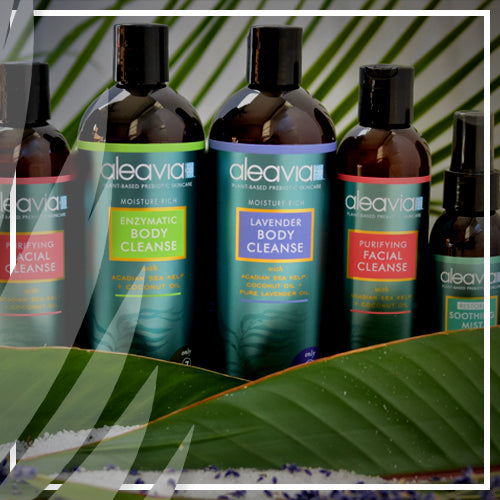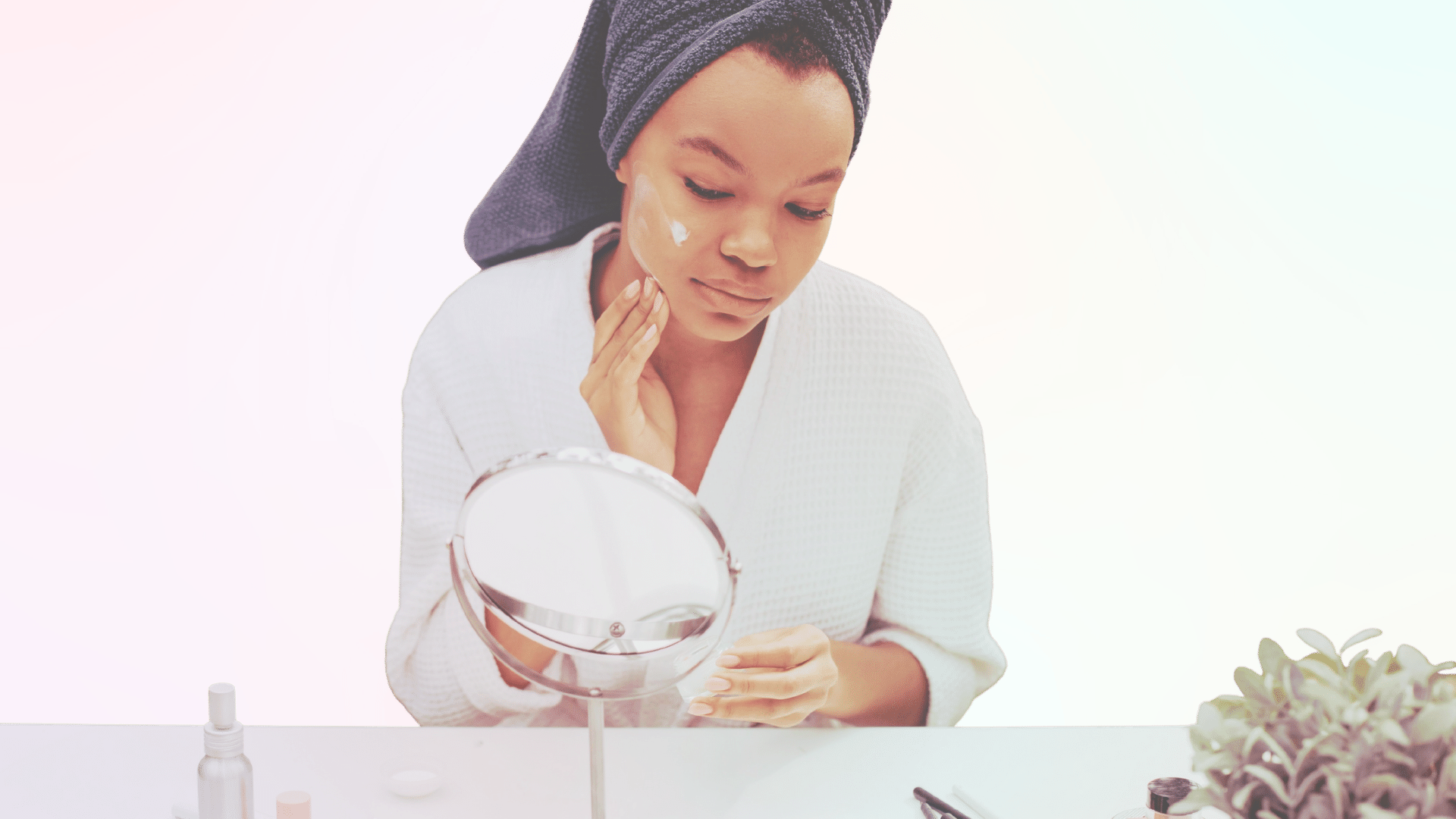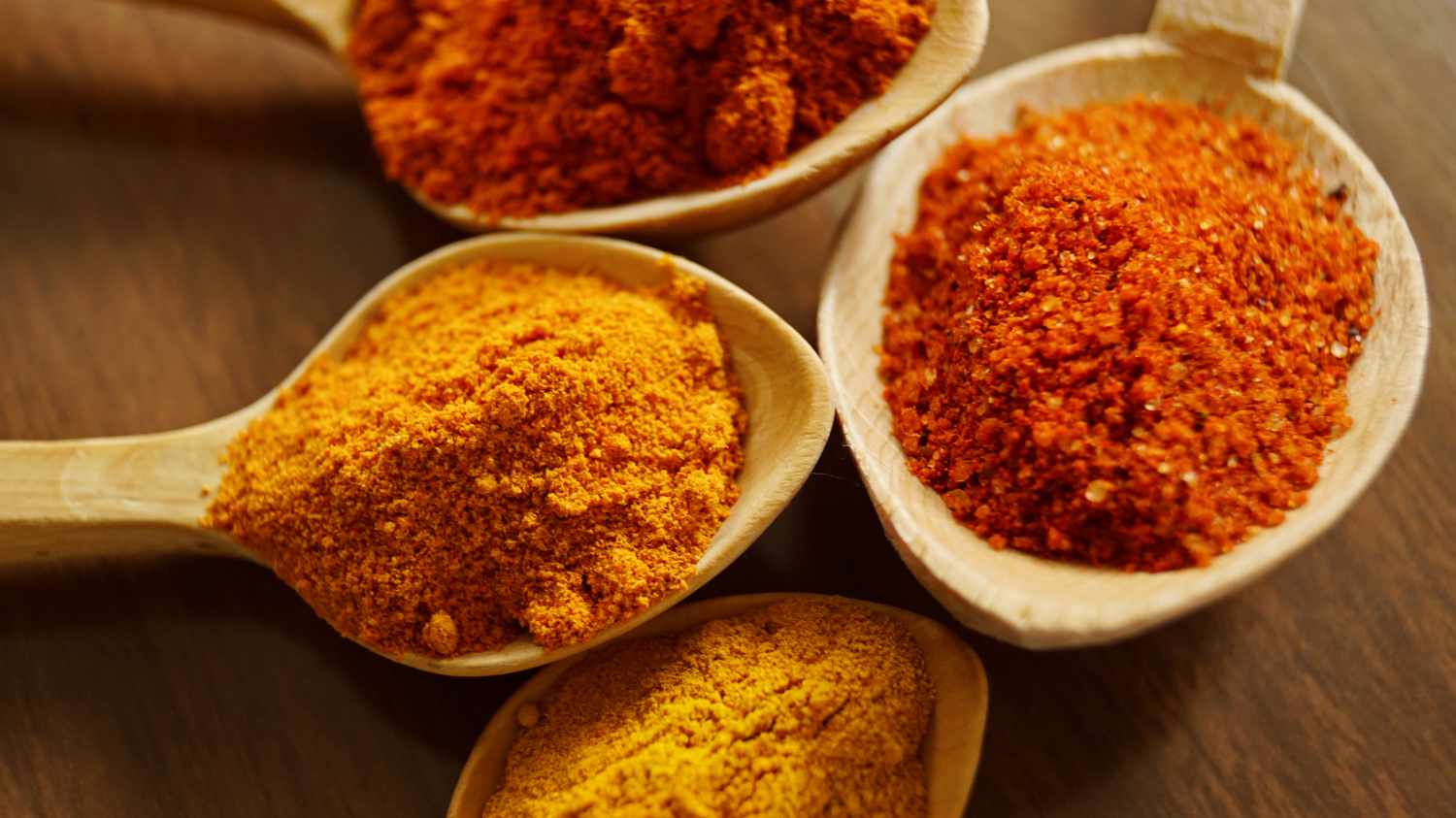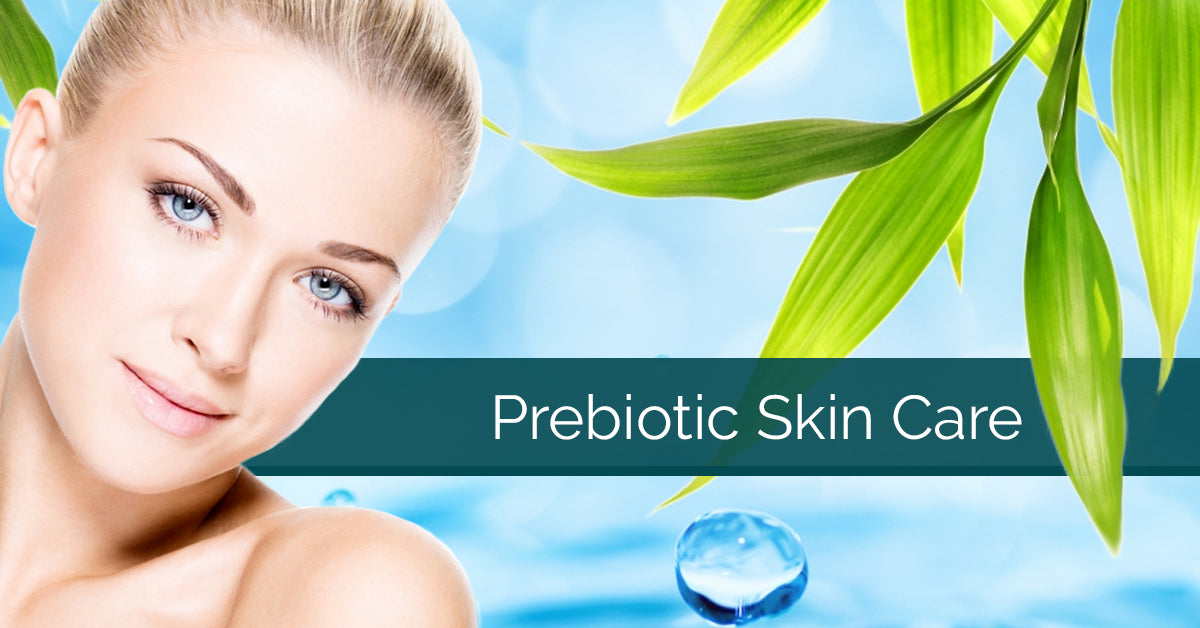
This post is the ultimate guide to all aspects of prebiotic skincare.
We’ll cover topics such as:
- What is prebiotic skincare?
- Prebiotic vs probiotic skincare
- Prebiotic skincare brands
- How prebiotic skincare actually works
If you’re ready, let’s dive in!
TABLE OF CONTENTS
- 1. What is prebiotic skincare?
- 2. What’s the difference between probiotics and prebiotics?
- 3. Why prebiotics are superior
- 4. What are the skin care benefits of prebiotics?
- 5. What does a prebiotic cleanser do?
- 6. How are gut health and skin health related?
- 7. What is the skin microbiome?
- 8. Do prebiotics help acne?
- 9. What prebiotic ingredients should I look for in skin care?
- 10. Prebiotic skincare brands and products
- 11. What are the side effects of prebiotics?
- 12. Who is prebiotic skin care good for?
- 13. What skin types benefit from prebiotics and probiotics skincare products?
- 14.How to incorporate prebiotics and probiotics in skincare
- 15.Should anyone avoid prebiotic skincare?
- 16.Conclusion
Disclaimer: The benefits of prebiotic skincare and Aleavia specifically have been positively vetted and approved by board-certified dermatologists, microbiologists, and medical doctors. However, we always recommend consulting your primary care physician or board-certified dermatologist before making major health changes.
It’s no secret that the world is going organic. From allergen-free foods to grass-fed beef to cleaner energy. Health and skincare products are certainly not exempt from this trend.
Over the past five to ten years, the public has questioned mainline skincare products and the unpronounceable list of chemicals we apply to our largest organ.
Likewise, we’re beginning to see just how much the chemicals in our food and skincare products affect our day-to-day health and energy levels.
If you struggle with skin conditions that mainline products don’t seem to be alleviating, or you just want to overhaul the health of your skin altogether, it can be overwhelming to know where to start.
Should you buy prebiotics? Probiotics? What about organic? What does that even mean?
Let’s start with some definitions.

What is prebiotic skincare?
Prebiotic skincare is a type of organic skincare that utilizes prebiotics to feed and nourish healthy bacteria on the surface of the skin. Prebiotics restore the skin microbiome, which can often help heal common skin conditions and revitalize the skin from the inside out.
Prebiotics are a source of food for the good bacteria in your skin (known as probiotics) which are responsible for maintaining the microbiome's health and vitality.
Prebiotics, when added to your skincare routine, restore or maintain the skin's strong barrier, which protects it from external invaders, maintains pH levels, and can even alleviate skin conditions.
What’s the difference between probiotics and prebiotics?
At some point, you may have had a doctor tell you to “take your probiotics.” That’s good advice, but probiotics aren’t just for your gut.
See, everyone has a unique microbiome — a living “society” of healthy bacteria that resides both in your gut and on your skin.
Therefore, the same idea behind ingesting probiotic supplements to spur on healthy bacteria growth is the motivation for applying probiotics to the skin.
Prebiotics and probiotics team up in the fight for a strong and healthy skin. But they are not the same thing; let us examine each of their roles separately.
- Probiotics are live bacteria that help to increase the population of “good” bacteria in your gut and on your skin.
- Prebiotics are specialized plant fibers that serve as food for probiotics, allowing them to multiply and do their jobs effectively.
Hence the “pre” prefix, these plant fibers (which can be consumed orally or applied to the skin) are the catalyst for good bacteria growth, leading to a healthy and well-balanced microbiome on both the skin and in the gut.
Why prebiotics are superior
Probiotics certainly have their place, but the superiority of prebiotics for skin and gut health lie in the fact that everyone’s microbiome is different.
This means the species of bacteria that your skin needs to thrive may be very different from the species my body needs.
If you were to stop at the local health store and peruse the probiotics section, you’d likely be overwhelmed at all the species of bacteria included in each supplement or skincare product.
Another way of thinking about probiotics is as a “one-size-fits-all” approach.
But how can you possibly know which supplement or product or bacterial species will yield the best result for your unique genetic makeup?
That’s where prebiotics come in. Prebiotics don’t dictate the exact species of bacteria that grow in your gut and on your skin, but simply create the most ideal conditions for these bacteria to grow and flourish.
Okay, so what? We’ve spent all this time talking about the difference between prebiotics and probiotics, but what does it mean for someone like you, who actually wants to have clear skin, more energy, and a chemical-free life?

What are the skin care benefits of prebiotics?
Here are some of the specific benefits of incorporating prebiotics into your skincare routine.
Prebiotics help protect the skin
Prebiotics facilitate a healthy balance of good bacteria in the skin's microbiome, thereby strengthening it. A strong microbiome acts as a shield against external influences such as harmful bacteria that can cause inflammation and breakouts.
Prebiotics don’t have harmful chemicals
Studies have shown us the ugly truth about how toxic chemicals in cosmetics affect our health. Instead of toxic chemicals, the ingredients in most prebiotic skin care products are entirely derived from plants.
Prebiotics can improve skin conditions
Including prebiotics in your skincare routine can help with skin conditions that are otherwise difficult to treat. In fact, it was the sole motivation for our founder to start Aleavia. Whereas everything else had failed for years, prebiotics skincare cured her daughter's eczema in less than a month. Amazing, right?
And this isn’t just a one-off anecdote. The healing power of good bacteria is backed by research, including this paper published in 2018.
This report gathered decades worth of clinical studies on what happens when you introduce healthy bacteria into adults with acne.
The result was a tremendous decrease in visible lesions, with a recorded 80% of patients experiencing clear skin.
Across the board, almost miraculous levels of healing were reported in individuals with dermatitis, psoriasis, and other skin conditions.
Due to the fact that prebiotic products are plant-based and safe for children, the paper also reports several incidents of infant and child skin conditions improving as a result of healthy bacteria on the skin.
We’ve seen similar results with our customers, who’ve shared some truly incredible before and after photos of Aleavia products healing their persistent skin conditions.
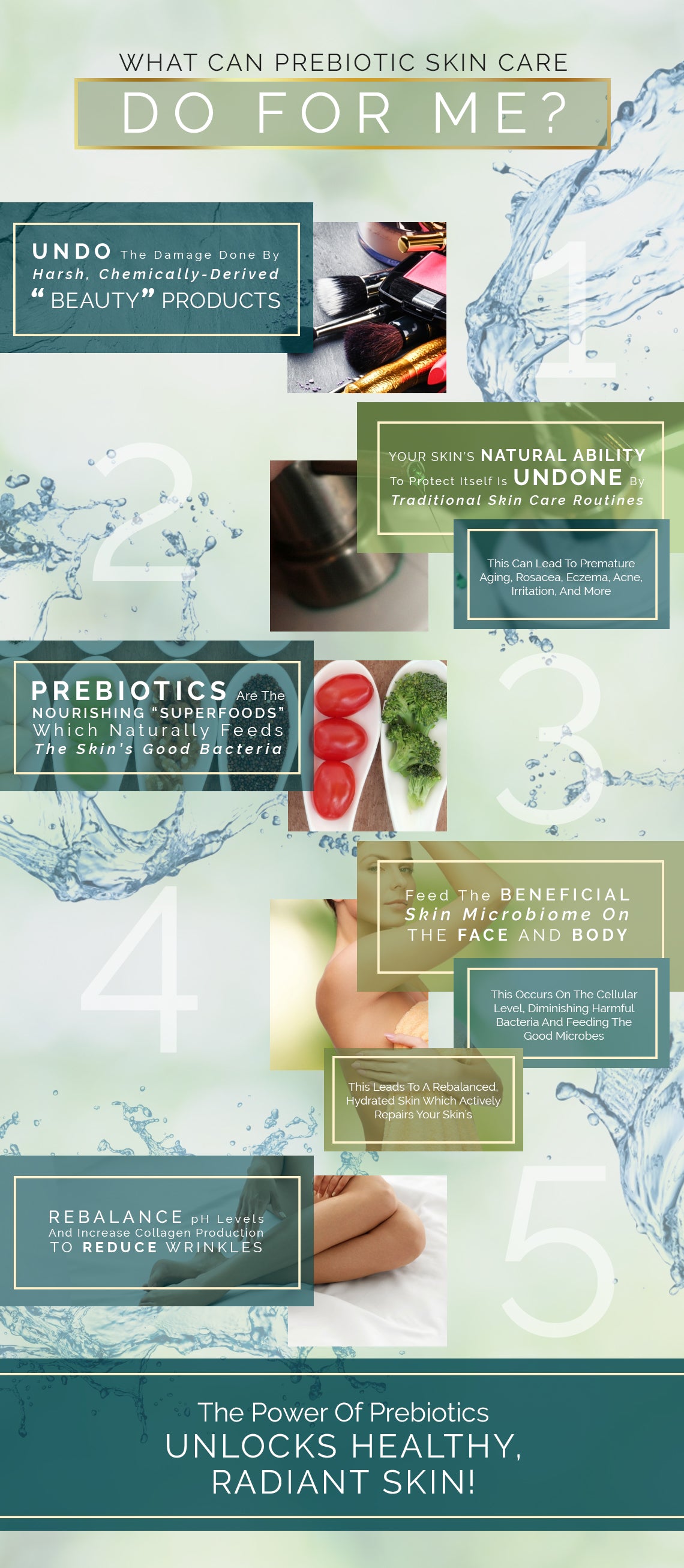
Prebiotics can restore the skin microbiome
An imbalanced microbiome leads to a variety of skin conditions due to "bad" bacteria in the microbiome “taking over.” Eczema, acne, rosacea, and other skin conditions are caused by a surplus of "bad" bacteria. Prebiotics help to restore this balance by feeding the “good” bacteria in the microbiome resulting in robust, healthy skin.
Prebiotics can slow the aging process
Hyaluronic acid, present in prebiotics, significantly decreases the depth of wrinkles and improves skin firmness and elasticity.
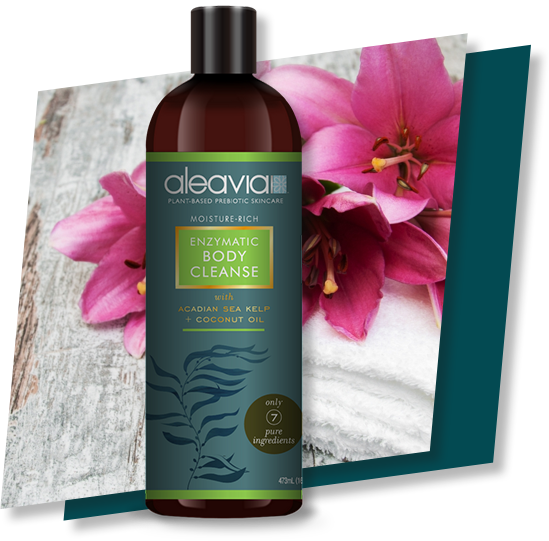
What does a prebiotic cleanser do?
A prebiotic cleanser will stimulate the re-population of "good" bacteria in your skin's microbiome.
For example, all of our cleansers are engineered to do the following:
- Gently remove dirt, toxins, and excess oil from the skin
- Feed the “good” bacteria on the skin with prebiotics — this is the “food” of your skin’s microbiome
As you make prebiotics part of your consistent routine, you’ll start to see the effects of a restored skin microbiome — namely, smoother, more radiant skin and even relief from common skin conditions like acne, eczema, and rosacea
How are gut health and skin health related?
There’s growing evidence that the health of your skin is highly dependent on the health of your gut. This direct connection of gut to skin is known as the gut-skin axis.
Here are some insights on gut and skin health:
- Scientists have discovered a direct correlation between gut health and skin conditions such as acne, eczema and rosacea.
- According to a 2012 study, patients with Inflammatory Bowel Disease (IBD) may develop lesions and other skin conditions.
- A 2017 study found individuals with rosacea have a higher incidence of gastrointestinal disease.
This demonstrates why it's critical to maintain the health of your gut in relation to the health of your skin.
Eating prebiotics-rich foods such as onions, leeks, avocado and asparagus and probiotics-rich foods such as yogurt, kombucha and kefir stimulate the “good” bacteria that support the vitality of your skin and gut.
As I mentioned above, the skin, like the gut, has a microbiome. This microbiome is a thriving ecosystem of microorganisms that protect the skin and body against external invaders while maintaining a healthy equilibrium.
Problems with your skin arise when this equilibrium is disturbed and thrown off balance. It’s the job of pre and probiotics to ensure this doesn’t happen or correct it if it does.
What is the skin microbiome?
Your skin contains trillions of strains of bacteria, viruses, fungi and microbes that collectively form the skin microbiome.
This ecosystem of microorganisms maintain harmony mainly due to their symbiotic relationship with the surrounding environment.
It's the disruption of this harmony of microorganisms on the skin that causes a variety of skin conditions. For example, one of the causes of acne is hair follicles becoming clogged by lipids and dead skin cells.
This happens when the microbiome is unbalanced with lipophilic bacteria.
Such skin conditions can be resolved by restoring the microbiome with the help of probiotic foods and prebiotics on the skin and in the gut.
Do prebiotics help acne?
Yes. Acne has many causes (such as hormones, stress, and excess oil on the skin), but a major one is an imbalance in the skin microbiome, as we saw in the previous section.
Prebiotics act as food for the "good" bacteria in the skin, assisting in their repopulation and thus restoring microbiome balance and curing or significantly reducing acne.
What prebiotic ingredients should I look for in skin care?
It’s crucial to be aware of the ingredients in your prebiotic skincare and their functions. For best results, use 100% organic skincare with ingredients such as:
Acadian sea kelp
Acadian sea kelp is teeming with vital antioxidants that protect the skin from UV light, free debris, pollution and other toxic environmental substances.
It’s also loaded with fatty-acids that not only permeate your skin with moisture but also retain the moisture through continued use, making your skin smooth as silk.
Sea salt
Sea salt is chock full of minerals that are beneficial to the body and skin. It’s popular in skin care products due to its detoxifying, hydrating and exfoliating properties which unclog your pores and allow your skin to breathe.
Aloe Vera
Aloe vera has benefited man for ages! It’s known to have over 200 biological compounds that range from sugars, enzymes, vitamins to amino acids and salicylic acids. These compounds offer a plethora of benefits such as moisturizing, hydrating and soothing the skin making it radiant regardless of age.

Extra-virgin coconut oil
Because coconut oil has anti-inflammatory properties, it’s ideal for irritated and grazed skin. It also increases the skin's collagen production due to the presence of lauric acid that helps the skin maintain elasticity and firmness (which helps with anti-aging).
Plant Glycerin
Plant glycerin is vegan friendly, acts as a moisturizer, prevents infections and accelerates wound healing.
The goal is to find products that contain a balance of prebiotic, exfoliating, detoxifying and moisturizing properties in their ingredients. This provides your skin with the holistic care it needs to be healthy and robust.
Prebiotic skincare brands and products
Now that you understand what makes a good prebiotic skin care product, let’s look at some brands you can start using right away.
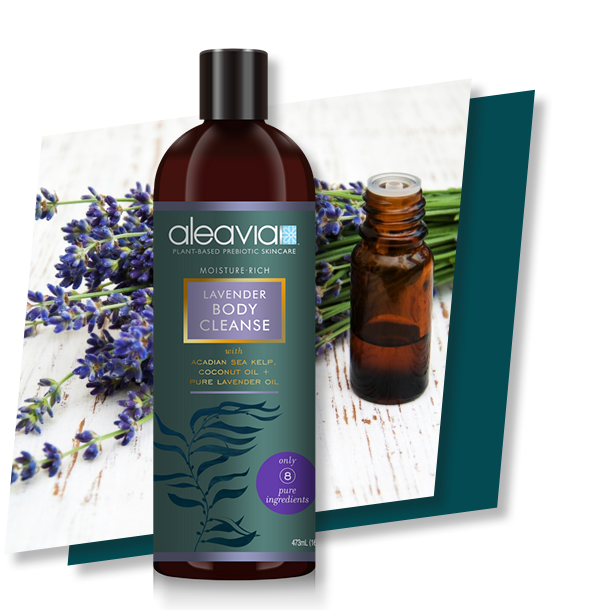
Aleavia
At Aleavia, we have a range of prebiotic-infused, all-natural skincare products, including body washes, lotions, and mists.
All our organic skincare formulations nourish your skin at the cellular level, infusing your microbiome with prebiotics and helping you realize all the benefits we’ve mentioned above.
It also helps with:
- Moisturizing the skin
- Sloughing off dead skin cells
- Balancing the pH level
All these result in healthy, vibrant skin and a balanced microbiome — without chemicals or toxins.
Prebiotic Emulsion Skincare Mask from Orveda
The Prebiotic Emulsion is a (pretty pricey) new product from the luxury brand Orveda that comes with a reusable silicone mask.
The three-in-one product can be used as a moisturizer, a hydrating serum or as a facial treatment mask used once-a-week. It claims to moisturize the skin by restoring lipids and hydration.
PREBIOITIX Hydrating Gel Moisturizer from Juice Beauty
This antioxidant-rich and prebiotic-loaded moisturizer restores and strengthens the microbiome. It’s packed with viola flower, chia and coconut which form a protective layer on the skin and lock in moisture keeping it hydrated and radiant. It also contains fermented kumaru which absorbs UV light and reflects back visible light.
What are the side effects of prebiotics?
Prebiotics have no known side effects because they’re made up of ingredients naturally found on the earth and in the sea.
Probiotics, although uncommon, are reported to cause some side effects. The fact is we’re all different, with unique overall health, skin and gut microbiomes.
Due to these differences we may have different reactions to probiotics introduced to our system. The good news is the symptoms are usually mild and subside with continued use.
Common side effects people experience from probiotics are:
Stomach Discomforts
The introduction of new probiotic bacteria into your body may cause a variation in gas production due to an increase in bacterial fermentation, which may result in bloating, gas, constipation, or general stomach discomfort.
It’s rare for one to experience this due to probiotics. In the case it happens, you can start with a low dose and gradually increase to the recommended dose.
At times the discomforts could be due to other factors e.g. medications and new foods. If the discomfort persists, it's best to see a doctor to figure out what's causing it.
Infection Risk
Probiotics, as previously stated, are safe for the vast majority of people. However, in a few cases, the yeast can enter the bloodstream and cause infections.
For example, it is estimated that only about one in one million people who take probiotics containing Lactobacilli bacteria will develop an infection. As you can see, the numbers are extremely low and if the infections do occur they are usually treatable with antibiotics and antifungals.
That’s why it’s critical to check the ingredients of any prebiotic product before using it. Check that the ingredients are organic, safe, and that you are not allergic to any of them.
Who is prebiotic skin care good for?
We’ve cited plenty of science that all claims the same thing: A healthy, clear skin is maintained by a balanced microbiome.
Prebiotics can help alleviate or significantly reduce various skin conditions such as:
- Acne
- Rosacea
- Eczema
- Atopic dermatitis
- Inflammations
- Skin hypersensitivity
- Dryness
All by restoring balance to the skin's microbiome.
What skin types benefit from prebiotics and probiotics skincare products?
Most skin care products that we are accustomed to are designed to treat specific conditions.
They are effective because they are designed to cure a specific condition, and all of the ingredients in the product are geared toward that specific purpose. For example, dry skin, acne, or inflammation.
On the other hand, prebiotics skincare products take a holistic care approach. By stimulating a balanced, stable, and healthy microbiome.
Prebiotics skincare products effectively target and treat skin conditions holistically.
This is why probiotic and prebiotic skincare products are rapidly growing in popularity. They have the potential to benefit anyone and everyone.
They can treat or significantly reduce common skin conditions, but that's not all.
Prebiotics give the skin a fighting chance against daily stressors like pollution, sunlight, harsh weather, and poor diet by strengthening the skin's barrier, resulting in radiant, clear, and smooth skin.
How to incorporate prebiotics and probiotics into your skincare routine
Prebiotics are effective on their own, but combining them with probiotics in your skincare routine yields far superior results.
This is why a prebiotic skincare cleanser such as Aleavia Enzymatic Body Cleanse is a must have.
For example, by using it in the morning and at night, it begins to clear away buildup from external stressors such as pollution, opening up your pores and allowing your skin to breathe.
Then it moisturizes your skin, leaving it soft and supple. The cleanser then nourishes the microbiota in your skin, making it balanced, strong, and healthy, thanks to the nutritious prebiotics in it.
Your face is the most delicate since it’s always exposed to external aggravation. Implementing a pre and probiotic face mask can work wonders in strengthening the skin’s barrier so it’s able to handle these stressors. Use the face mask after cleansing but before applying any serums or creams.
After applying the cleanser and gently patting your skin with a towel, it's time to apply a prebiotic mist. They are known to relieve rashes, redness, and irritation.
To avoid allergic reactions, always use fragrance-free, non-comedogenic pre and probiotic skincare products. When purchasing probiotic products, make sure the packaging is opaque to keep light out.
Should anyone avoid prebiotic skincare?
Prebiotics and probiotics should be avoided if you have recently had surgery, have a compromised immune system, have acute pancreatitis, or have been hospitalized for an extended period of time.
A good rule of thumb is to always consult with your doctor before making any drastic decisions.
Conclusion
The world is finally waking up to the truth that we’ve been preaching for years now: most skincare conditions must be treated from the inside out.
The acne, rosacea, or dryness that’s been plaguing your skin could very well be the result of a much deeper issue — an unbalanced microbiome, either in the skin or gut.
This imbalance indicates that the "bad" bacteria in the microbiome have outweighed the "good.”
A variety of factors may contribute to this, including daily intensive hygiene, which scrapes off the "good" bacteria in your skin, a poor diet, and certain medications and cosmetics.
Implementing prebiotics skincare into your daily routine stimulates the repopulation of "good" bacteria in your skin’s microbiome resulting in a healthy, strong, soft and supple skin.
